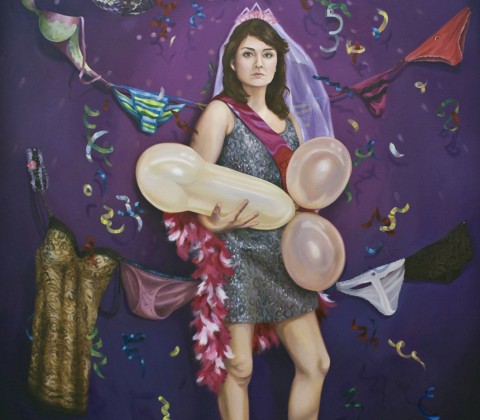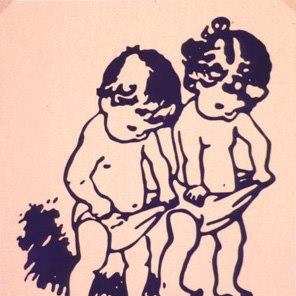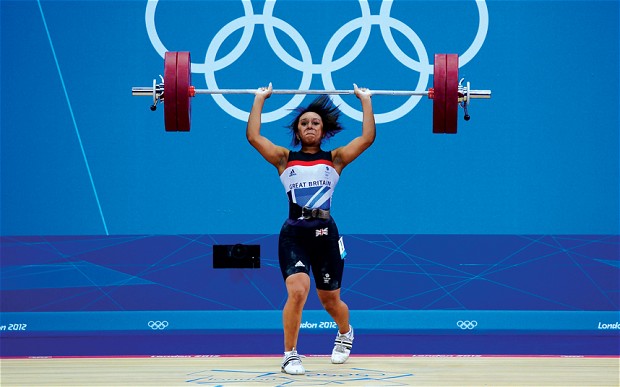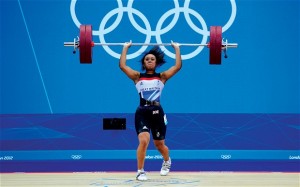Posts Tagged: hostile sexism


The Power of the Penis Tiara
 Originally published on In the Powder Room. Reprinted with permission.
Originally published on In the Powder Room. Reprinted with permission.
It’s not often that penises are appropriate outerwear. They’re weather sensitive, you never know if you’re going to pull out a turtle or v-neck, and they shrink in the wash. Occasionally, they create a pearl necklace.
For bachelorettes though, the dick diadem is standard ware for one night. When asked by a bachelorette (who opted out) why brides wear them and why they attract so much attention, I thought, “What a sizable question!”


Emma Watson and Men’s Self-Fulfilling Prophecy
Emma Watson’s impassioned United Nation’s speech seeking both sexes to peacefully unite in order to achieve women’s equality has touched a nerve. Inaugurating the HeForShe campaign, Watson went on to explain that fundamental feminism “… by definition is the belief that men and women should have equal rights and opportunities. It is the theory of political, economic and social equality of the sexes.”


Are You Sexist? Take The Test
“Women — you can’t live with them, and you can’t live without them.” 
‘This male quip captures something essential about the face of sexism: an ambivalence, or doubled-edged way of thinking, in which women are sometimes treated with contempt and sometimes adored.’
‘How can adoration qualify as sexism? To answer this question, you are invited to take the Ambivalent Sexism Inventory and explore the dual nature of prejudice toward women. The inventory takes roughly 5 minutes to complete, and afterward you can compare your level of sexism with the scores received by people from around the world’
The following is an excerpt from UnderstandingPrejudice.org. The test is for both men and women. Take the test by clicking the link and following directions to see how you score. UnderstandingPrejudice.org: Ambivalent Sexism Inventory.


Olympic Athlete Fights Sexism with Witt, Words and The Web
British Olympic weightlifter Zoe Smith, 18 was in a documentary on BBC,  “Girl Power – Going For Gold.” Some Twitter commentators said Smith was more or less too masculine, should be more feminine in order to attract a man and that she should ‘go make her boyfriend a sandwich.’ Smith fired back on her blog, confronting a particular commentator (who apparently couldn’t handle the fight because the username is now disabled) and is being hailed for her smart and strong retort.
“Girl Power – Going For Gold.” Some Twitter commentators said Smith was more or less too masculine, should be more feminine in order to attract a man and that she should ‘go make her boyfriend a sandwich.’ Smith fired back on her blog, confronting a particular commentator (who apparently couldn’t handle the fight because the username is now disabled) and is being hailed for her smart and strong retort.
“We, as any women with an ounce of self-confidence would, prefer our men to be confident enough in themselves to not feel emasculated by the fact that we aren’t weak and feeble.”
The negative comments are a good example of hostile sexism. Hostile sexism is the negative treatment of women because they do not fulfill traditional, feminine gender roles (which is benevolent sexism and this keeps women subservient in traditional feminine gender roles). How to connect this to marriage? Well, marriage is a typical path for women to fulfill traditional feminine gender roles. Exchanges like in this article are an example of how those roles effect other areas women are engaged in, as evidenced in the sexual comments directed at Smith. It’s not necessarily sexism in the Olympics. The strong presence of women in the Olympics encourages lingering sexism in our communities to surface. It is an unfortunate event, but on a positive note it does highlight we, indeed, do not live in a post-feminist society and tells us we still have important work to do.
Women’s weightlifting was introduced at the 2000 Olympics in Sydney. Smith went on to break the British record in the 58kg competition by lifting twice her weight (211kg), but finished 12th out of 19 overall.
To read the article from Feministing.com and many more about sexism in the Olympics click here.




